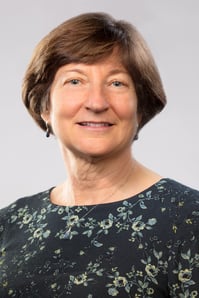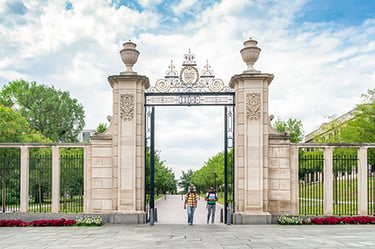 Could you tell us a little bit about your background and experience?
Could you tell us a little bit about your background and experience?
I grew up on a tiny farm in Fayetteville, Georgia. Because my family was poor, my siblings and I were always trying to figure out ways to make money. I think growing up poor and on a farm is great training for entrepreneurs because farming forces them to be inventive, learn from unexpected failures, and develop a very strong work ethic. Although I do not consider myself to be an entrepreneur, I think I have been entrepreneurial from a young age.
I got my PhD in strategic management with a focus on entrepreneurship from the University of Georgia in 1988. At that time, the field of entrepreneurship was in its infancy, but it is now one of the fastest growing fields of study in business. I came to the University of Arkansas in 1990, founded a student-run business in the Walton College in 1996, and started advising business plan teams in 2002.
My husband and I made our first angel investment in one of these teams, BiologicsMD, a VIC portfolio company, in 2011. I have continued to work with interdisciplinary teams and invest in high-growth startups since then.
You retired last year from the Sam M. Walton College of Business at the University of Arkansas but continue to be involved as a mentor for student teams participating in the New Venture Development course, a course that you started and led for about 15 years. Tell us more about your motivation behind developing this unique program, and how it has impacted the region's entrepreneurial activity.
I would like to say that I had the foresight to understand the impact business plan competitions could have on students, but it was a very bright undergraduate student who subsequently got her PhD from MIT who showed me the way. After I saw the experience she had competing at the Arkansas Governor’s Cup (developed by Arkansas Capital Corp.), I knew that these competitions could be transformative for students.
 At the beginning, my teams were focused on traditional small businesses, but gradually the focus shifted to high-tech, scalable businesses. Together with an engineering faculty member, we developed a Graduate Certificate in Entrepreneurship, and from that point on our interdisciplinary teams began making their mark at the national and international levels.
At the beginning, my teams were focused on traditional small businesses, but gradually the focus shifted to high-tech, scalable businesses. Together with an engineering faculty member, we developed a Graduate Certificate in Entrepreneurship, and from that point on our interdisciplinary teams began making their mark at the national and international levels.
A 2008 team, Movista, showed what could be done beyond the competitions. They are a very successful SaaS company based in Bentonville that employs over 100 people. They were followed by 22 other companies that have raised more than $100 million in capital and have played a key role in the development of the Northwest Arkansas entrepreneurial ecosystem. Some teams, like Movista, BiologicsMD, and Lapovations, continue to be led by the founding students. Other companies, like NOWDiagnostics and AscendentDx, benefited from the groundwork the student teams laid for the companies.
The Northwest Arkansas region is seeing a surge in technological innovation coming out of the U of A and a huge push for an entrepreneurial ecosystem. How have things changed over the last decade and what do you think this growing region has to offer to entrepreneurs and early-stage startups?
The Northwest Arkansas of 2011 looks almost nothing like the Northwest Arkansas of 2021 on a number of fronts. Although it might seem like Crystal Bridges Museum of American Art has little to do with the entrepreneurial ecosystem, Crystal Bridges is both reflective of the quality of life that has been a hallmark of the region for years and a driver for the future. The Waltons’ investment in quality of life initiatives like the trail system, restaurants, healthcare, and the Heartland Summit have made Northwest Arkansas a viable destination for entrepreneurs.
These quality-of-life investments have been complemented by the Walton Family Foundation’s investment in the University of Arkansas’s entrepreneurship and innovation activities. Led by Sarah Goforth, the UA’s Office of Entrepreneurship and Innovation has expanded rapidly in the past two years and now offers a multitude of programs and activities for students, faculty, and the general community. Many regions of the country and the world are trying to promote entrepreneurship because it is the foundation for economic development. However, I think Northwest Arkansas is unique in the extent to which successful people here help new entrepreneurs succeed. There is a humility and willingness to help other Arkansans that is rare and invaluable.
What do we need to do better to improve VC activity in the region? Which industries do you see emerging and proliferating in the next 10 years in this region?
To improve VC activity, we need to increase the number of VC-worthy investments. I believe we will see these types of investment grow dramatically in the future as other investors see the quality of startups we have here. Strong investor returns will draw more capital to the region, creating a virtuous cycle.
As an investor, I wish I had a crystal ball that predicts which industries are most likely to produce VC-worthy investments in the next 10 years. We have a competitive advantage around retail data analytics and supply chain that startups in this area will undoubtedly continue to exploit. The Whole Health Initiative funded by the Alice Walton Foundation and UAMS’s expansion in the region are likely to increase the number of healthcare-related startups. I hope that we continue to see startups in power electronics and clean energy because, without a solution to climate change, our future is dim.
What got you interested in VIC and joining the VIC Investor Network? What is VIC doing right or different from its competitors?
 I have heard a lot of smart investors say they invest in people rather than ideas because smart people will learn and adapt as called for by the situation. Calvin Goforth is extraordinarily smart and forward-thinking, so that is what initially got me interested in VIC. I do not have a science background, so Calvin and his team do what I cannot - assess early-stage technologies and make calculated bets on which have the best chance of success. I think VIC’s ability to assess cutting-edge science sets it apart from its competitors.
I have heard a lot of smart investors say they invest in people rather than ideas because smart people will learn and adapt as called for by the situation. Calvin Goforth is extraordinarily smart and forward-thinking, so that is what initially got me interested in VIC. I do not have a science background, so Calvin and his team do what I cannot - assess early-stage technologies and make calculated bets on which have the best chance of success. I think VIC’s ability to assess cutting-edge science sets it apart from its competitors.
More important to me is the level of integrity from the entire VIC team. Investing in startups is inherently risky. However, I feel that I can trust everyone from the VIC team and that if a startups fails, it will not be because a VIC manager has misrepresented the technology’s capabilities or outlook.
You have invested in quite a few startups spanning different sectors. How do your experiences and interests align with VIC's mission? What do you look for in a company and/or technology before deciding to invest?
I want to see great technologies coming out of universities be commercialized rather than sitting on the shelf. VIC does that.
I do not have a systematic approach to investing in companies other than making sure that I have confidence in the management team. I want to make sure that someone who understands the technology thinks it shows good promise and that there are for positive trends for industry growth. Personally, I am most interested in clean tech companies because I think our time to address climate change is rapidly dwindling.
What words of advice do you have for budding entrepreneurs (and investors backing their startups) bringing university technologies to market?
My main piece of advice is to make sure that there is a market for the technology and that a startup can reasonably get to a significant value-creating milestone with early-stage capital.
Also, the happiest entrepreneurs I know are intentional about pursuing things in life other than their startup. Being a startup founder is extremely stressful; it is a journey of extremely high peaks and low valleys. Without having life balance, it is hard to keep at it for as long as it takes to successfully commercialize a university technology.
As someone who's had extensive experience working with and investing in startups, what are some lessons you learned that you could share with fellow investors?
The most important lesson is to never invest money that you cannot lose in a startup. Following this advice will reduce an angel investor’s stress level.
Similarly, I would never invest in a team that I did not trust.
Third, I have had fun as an investor. I have learned so much about investing and about different industries from both my students and from my investments. Staying engaged with changes in the world keeps my brain neurons firing.

